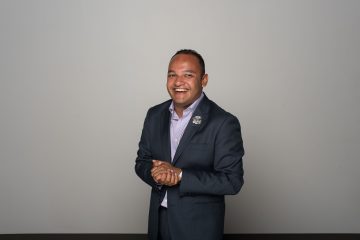Biography

Darran’s career in education spans three different Canadian post-secondary institutions and is currently the University Registrar at York University in Toronto, ON. He is a professional coach (ICF Certified) and educator who spent the last 11 years in Vancouver in various roles at the University of British Columbia. Most recently, he has dedicated his career to enhancing the experience for students in the core administrative areas of the institution – the Registrar’s Office – believing that building a strong and positive foundation allows co-curricular services and academic development to build from a place of positivism.
His work in the sector ranges from service on the boards of UBC, the BC Council on Admissions and Transfer (BCCAT) and the Canadian Association of College and University Student Services. He’s currently pursuing his Educational Doctorate from Western University. When he has free time he curls, runs and is busy exploring his new city with his lab-mix dog, Lex, in Toronto.
Meeting Darran
What is your most memorable experience from your time in the Faculty of Education?
The evolution of the faculty, its infrastructure and that my academic colleagues continue to be part of my administrative journey. To watch the building of the Ponderosa building in place of the huts that existed there previously honours the value of education in the landscape of UBC and the province – it’s been remarkable. The faculty that I engaged with through my master’s degree I still remain connected to in offering me counsel, reflection and support in the years that followed at UBC and to this day when I’m at York University. When your academic leaders and colleagues see the value in teaching, mentoring and supporting even after a student graduates is a testament to the passion of the faculty and the care for building leaders.
Where has your education from the Faculty of Education taken you in your career?
My time in the Faculty of Education have introduced me to education alumni in my community while at UBC and now in Toronto at York. The diversity of perspective I got in my program at UBC provided me with perspective I hadn’t received at that point in my studies – I’m grateful for my course mates who have supported that mental shift for me. Understanding the foundations, intersections of and value of post-secondary studies and policy development for students, staff and faculty guides how I lead in my current role.
Where do issues of inclusion find a place in your life or at work?
As a marginalized Canadian, issues of inclusion are always present in my day-to-day. One of the reasons why I chose York University as somewhere I wanted to work was the school’s focus and commitment to lifting students who are traditionally marginalized and need to find access pathways to the institution. In my work I embody the concept that fairness doesn’t mean sameness – meaning in order to treat people fairly we cannot treat them the same way as the person before them. It means that our work may take longer to execute, but it’s done so in a way that honours the person in front of us – taking into consideration the unique identities and characteristics of the human in front of them as opposed to comparing it to the hundreds that preceded them.
Do you have any words of wisdom for current students? Newly graduated folks?
- 1: Find a way to fail safely. Create conditions that support your ability to break some rules, test out the extremes and fail in a way that supports your learning and development – and minimizes (if possible) the messiness for others.
- 2: Make a plan – and be okay with having a plan. I’m a planner, and an advocate for planning. Plans don’t need to be followed, but they can help you chart a course. The course I’ve currently planned is to work to having a sabbatical – or break – of some sort every 5-7 years. A period of time ranging from 4-8 months to take care of myself, reflect on the past and plan for the future.
- 3: Make sure you acknowledge, thank and honour those that have supported you. I have had quite a number of significant events this past year – friends passing away, changes in relationships, moving cities, provinces and employers – to name a few. Acknowledge those that you care about and have supported you and think intently about how you can support others to be their best selves.